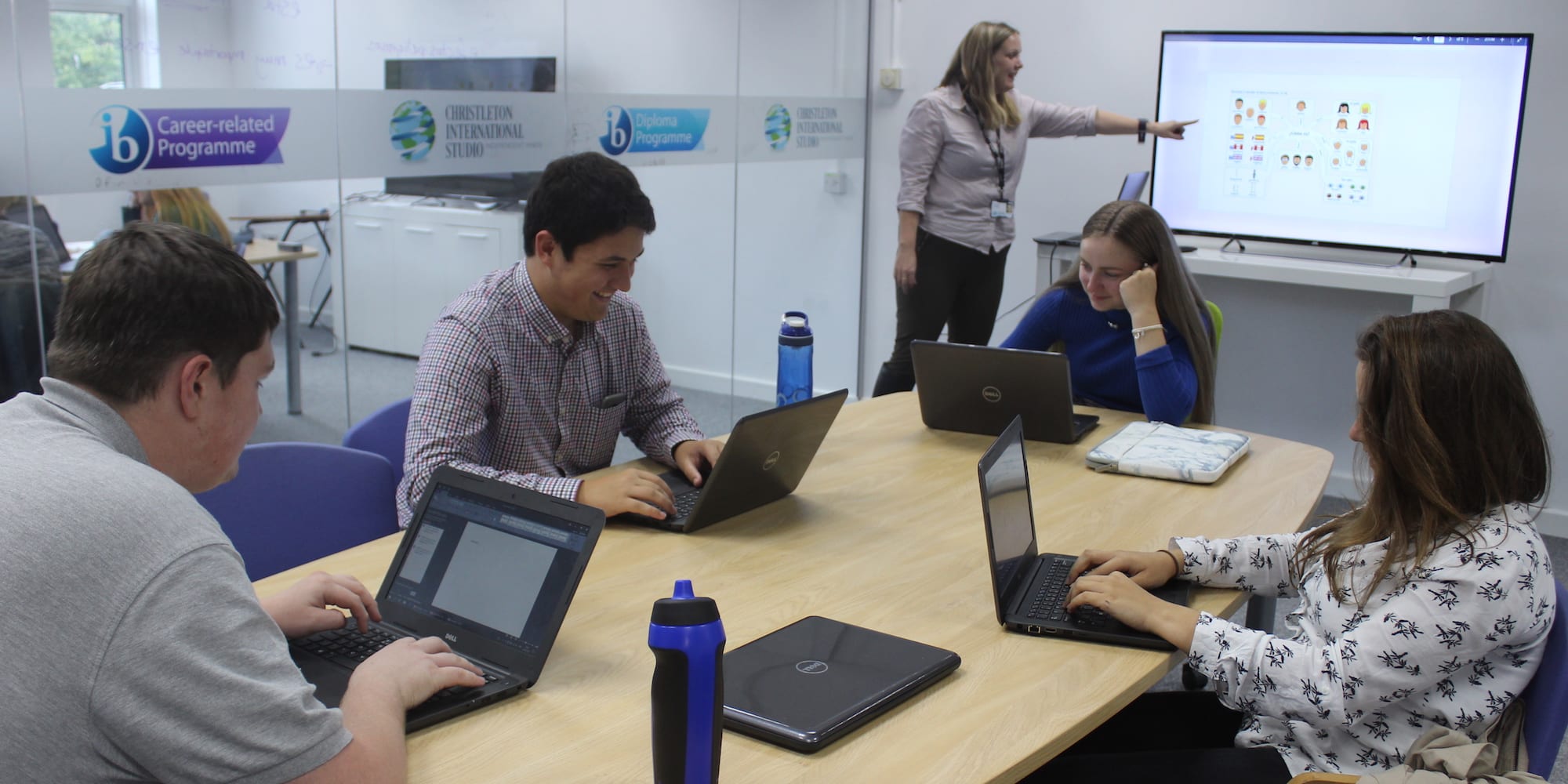
Please, no more dull learning
CASE STUDY – The application of lean management to education is not new, but we all know how hard changing legacy systems is. This greenfield lean school aims higher, trying to rethink learning altogether.
Words: Tony Lamberton, CEO, The Learning Trust and Kate Unsworth, Principal at Christleton International Studio
Tick, tock, tick, takt goes the clock, and we believe the time has come for us to transform education once and for all.
At The Learning Trust (recently renamed from Christleton Learning Trust), we set out over a decade ago to improve learning for our students. We wanted to change from a push model in which we were “manufacturing” children for life to a pull model where our focus is developing their talent. We are interested in lean learning rather than education or schooling.
This article is a call for help and support to enable the sharing of our lessons and draw on the brains and experience of all lean practitioners. Learning is at the heart of all that we do. Communicating, sharing and improving is at the heart of lean. So it is obvious that you can’t lean if you can’t learn.
By creating the right conditions and circumstances, at the Trust we believed it would be possible to respond to learners' needs and grow rather than manufacture their learning. Initially, we tried to do it through choice, differentiation of tasks and separation of knowledge, skills and expertise. We created quality time for regular staff learning, and insisted that learning was everyone’s responsibility all the time. We welcomes failure but not mistakes.
We dedicated ourselves fully to this undertaking, but struggled against overlarge systems and expectations that were driven by customer and habit rather than relevance and need. Still, the classroom clock tick tocked. The takt time of out transformation was too long and value too low.
We decided to start afresh and opened a new government-approved and sponsored Free School. We wanted to create a more agile and appropriate context and also to demonstrate what is possible when you dump the systems and institution that schooling can become. This fresh start would enable us to run lean learning experiments in a fertile environment and see what was possible. Many in the Lean Community contributed ideas to this startup and have continued to do so after my plea to you at the 2015 UK Lean Summit in Leamington Spa. In parallel, we have continued to run experiments to define value added in education and practical lean projects to drive out waste from our existing schools.
Christleton International Studio (CIS), now in its second year, is due to move into its new purpose-built accommodation in January 2019 when it will become Chester International School. There, our new “laboratory” will accelerate and we will be able to share fully our lessons and progress of our paperless, technology-rich lean school.

But how did we get here?
CIS was established following the guidelines Eric Ries shared in The Lean Startup and leveraging the experience one of us (Kate) had gained in multiple international startup settings. We set standards and work procedures prior to opening the Free School, using the International Baccalaureate as a framework (in fact, CIS was the first school in the world to be approved for both the IB Diploma and Career programs before opening).
Our students always come first. No exceptions. We are obsessed with the experience that they receive and their level of happiness and engagement with their learning. For every decision we make, we ask ourselves the critical questions of “How will this impact our students?” and, more importantly, “What will the positive impact for our students be?” All students are baseline-tested on entry and systematically and regularly tested for progress, with coaching and elective lessons used to further accelerate their learning or help them to catch up. They own this data, which is there to help them succeed. They welcome the chance to prove their learning and to fill the gaps ready for the next step of the learning journey.
Our mindset is one of open sharing of planning, resource and assessment, which ensures that the production line and flow of value are highly visible. That improvement and the idea of learning from failures are embedded in our way of thinking. Lean values and ethos have been regularly reviewed and discussed to ensure that, as an organization, we strive for efficiency and kaizen. To achieve this alignment, we arranged several training and coaching sessions for everyone – from students to support operations, from leadership to Trustees. We are so grateful for the support from the Lean Enterprise Academy, which has enabled us to keep true to lean values. All in CIS are offered continuous opportunities for improvement of the learning experience and investment in value-adding work, with full job security for our staff. The result is an innovative paperless school working in a completely different way.
WHAT WE HAVE LEARNED SO FAR
We have learned so much that one article is not enough! Our learning progress has exceeded our expectations. Many of the students who originally chose to change school and trust us were lost in the system. They were not naughty or lazy or disaffected. It was the system failing them. Was this all the school could give them? They wanted to get and give more. By trusting them to take ownership and removing so much of the wasteful systems of control we have been able to create better value and shorter takt times. We recognize that improvement is continuous and can only happen in an open culture: the CIS school model is one that will never be complete. Instead, we operate within a constant cycle of innovation and improvement (we even named out staff workroom “Kaizen”).

Our three inspections from the UK’s Department of Education have been really pleasing, supporting our work and innovation and encouraging us to reflect and move forward. The challenge has been innovating and raising expectation and standards, and evidencing this to those who believe only in orthodox schooling. The test is useful, as CIS must inspire, enlighten and deliver qualifications. Coaching is not good enough yet, and we have completely revised the methodology to include lean coaching with the idea that in the future all will be coaches and we can coach to need rather than program.
We didn't take solutions and systems from established schools. Instead, when designing CIS, we questioned everything we did to ensure what we included added value at every step. We have also had to accept that a number of muda can’t go away, if we want to make our school model acceptable to accreditation bodies, families and the Department of Education. But we are not finished yet!
As a school trying to bring innovation to learning, CIS wouldn’t be viable if it didn't fully embrace technology as a way of making systems and processes effective. All lesson resources, student work and feedback are online and families also have access to these, which ensures all stakeholders work together, improves communication, and ensures teachers share teaching material and plans. Technology also allows for accessible information about our school – be it family guides, lesson planning and resources to standardize expectations, feedback processes and making explicit what we want to see. In the days of Artificial Intelligence and virtual learning, there are many ways to learn and our determination is to exploit them.
One of the most critical lessons we have learned is that using lean management within an International Baccalaureate context creates no problem. In fact, the two marry perfectly, creating and strengthening the natural links between subjects and ensuring that students and all members of a team view themselves as being responsible across the school and curriculum.
WHAT THE FUTURE HOLDS FOR CIS
As a new organization, we have much work to do when it comes to our lean transformation. We think that one of the biggest challenges we will face is to make sure that our growing team fully understands and shares our mission, values and strategic priorities and lets them shape their thinking and our DNA as a lean enterprise.
Our future efforts will focus on defining our intentional improvement practice, after two years spent establishing vision and work standards. To do this, we continually involve stakeholders in our improvement work. It is of vital importance to give them the opportunity to share their feedback, design improvements and input in a number of other ways. We will also spend more time systematically and sincerely celebrating the successes achieved by our team members and lean experiments. This recognition nourishes confidence and motivation.
A lean organization understands customer value and focuses its key processes to continuously increase it. Our ultimate goal is to provide perfect value to our students by establishing a perfect value-creating process that has zero waste. As we enthusiastically continue on our journey, we are keen to hear from other lean thinkers out there. What do you think makes for good lean learning? How can we equip children around the world with the skills they will need to face up to the many challenges they’ll encounter?
THE AUTHORS


Read more


1 QUESTION, 5 ANSWERS – Lean management causes a huge shift in the mind of leaders, one that dramatically changes the way they think of themselves and the way they behave. We asked five leaders to tell us how lean changed them.


WEB SERIES - In the last episode of our It's a Lean World series, we travel to the tip of South America to visit the southernmost Distribution Center in the world and learn about its lean work.


INTERVIEW – General Electric’s Angie Norman talks to our editor about the lean journey of the company’s Finance department and how the area became a driver of GE’s overall transformation.


FEATURE – What does levelled production have to do with product costing? This article explains how getting your accountants to understand this link can help your company become less complex, more efficient and profitable.

